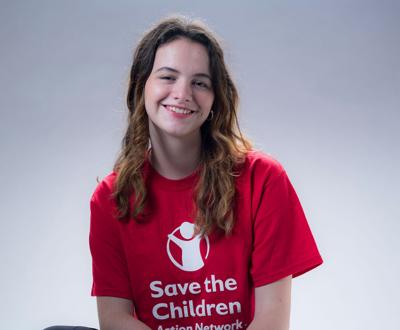Youth activism on both the national and local level has been particularly visible in the past few years. There were student walkouts in cities across the U.S. in January to protest the lack of COVID-19 precautions in schools. Students who survived 2018’s school shooting in Parkland, Fla., have advocated for gun reform in various states, attracting other high-schoolers to the cause. In summer 2020, Nashville saw a massive protest against police brutality organized by a group of teenage girls.
While youth organizing efforts can often lead to protests in places like state capitol buildings, they sometimes start in high school clubs with students like Avery Shippen.
Shippen, a senior at Hume-Fogg, is president of her school’s Save the Children Active Network chapter and the treasurer and project manager of Livable Schools, an environmental sustainability club. SCAN advocates for issues like access to education, ending child hunger and protecting the rights of children who arrive at the U.S.-Mexico border. As part of that group, Shippen has helped organize postcard-writing campaigns to politicians, set up lunchtime events with U.S. Rep. Jim Cooper, coordinated phone banking and more. Livable Schools advocates for a greener Hume-Fogg, and one recent project was a food-waste audit that measured the student body’s table scraps.
“I like helping people,” says Shippen, noting her experience doing volunteer work with Second Harvest Food Bank of Middle Tennessee. “I knew I wanted to continue doing something that would help people, and SCAN is a really good way to do it directly.”
Shippen says one of the things she’s most proud of is spreading awareness about “the types of topics that people don’t really want to think about when they’re in high school,” especially when it comes to issues facing children. She says high-schoolers usually try to distance themselves from being called children — pointing out that they’re almost adults, almost in college — but SCAN enables and encourages kids to speak up for other kids. “It’s been nice to see especially 17-year-olds or 18-year-olds be like, ‘OK, yeah, it’s more powerful for me to talk [about these issues] from the perspective of a student who is still a child.’ ”
The Mayor’s Youth Council, sponsored by the city and coordinated by youth-outreach organization Oasis Center, also gives a platform to young activists and budding policy wonks. A few members of the council are partnering with the Cumberland River Compact to organize a youth climate summit in March. The Scene spoke via Zoom to four members of the climate committee, who say being on the council amplifies their voices and shows that their generation cares.
Eleanor Taylor, a senior at Harpeth Hall, described the Mayor’s Youth Council as “a group of youth in Nashville who are interested in various spheres of activism.”
“And so during the year, we pick a specific subject to research and then … present that to the mayor [as] our specific group,” says Taylor, adding that in addition to the environmental group there are others focused on homelessness as well as diversity and equity.
The Nashville Youth Climate Summit is the big spring project for the committee, and the rest of the semester will be focused on creating a social media account that provides resources and information for how other students can get involved in sustainability efforts.
Grace Olson, a junior at Martin Luther King Jr. Magnet, got involved in the youth council after attending last year’s climate summit. In addition to helping with the 2022 summit, she also founded the MNPS Environmental Committee, which is open to students from all public schools, and has spoken to school directors about efforts like composting and food waste audits.
Apeksha Sawarkar, a senior at Hume-Fogg, says the summit also gives students a chance to hear from experts who can break the topic down in an easy-to-understand manner. She adds that members of her generation might also feel a bit more urgency about the topic.
“We’ve been told that it’s going to impact us the most,” she says, “so that has made it more imperative that we really care about what’s being done now.”
Brady Mitchell, a freshman at Martin Luther King Jr., joined the council this year and says exposure to new ideas has been one of the biggest benefits of joining the project.
“It helps me understand what people are thinking and how I can help a community, such as this one, to act,” says Mitchell.
“I think other youth are able to see what change we’re making and see that they can do it themselves too,” says Olson.
The Nashville Youth Climate Summit takes place on March 5, and space is limited. Find out more details and register here.
Student activists, the Youth Poet Laureate, banned books, our first student essay contest and more






